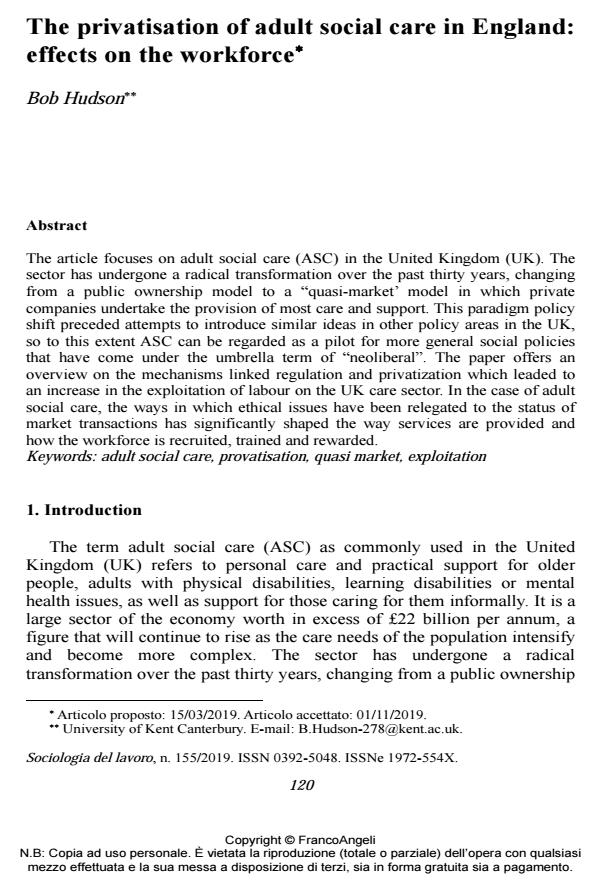The privatisation of adult social care in England: effects on the workforce
Titolo Rivista SOCIOLOGIA DEL LAVORO
Autori/Curatori Bob Hudson
Anno di pubblicazione 2019 Fascicolo 2019/155
Lingua Inglese Numero pagine 17 P. 120-136 Dimensione file 222 KB
DOI 10.3280/SL2019-155006
Il DOI è il codice a barre della proprietà intellettuale: per saperne di più
clicca qui
Qui sotto puoi vedere in anteprima la prima pagina di questo articolo.
Se questo articolo ti interessa, lo puoi acquistare (e scaricare in formato pdf) seguendo le facili indicazioni per acquistare il download credit. Acquista Download Credits per scaricare questo Articolo in formato PDF

FrancoAngeli è membro della Publishers International Linking Association, Inc (PILA), associazione indipendente e non profit per facilitare (attraverso i servizi tecnologici implementati da CrossRef.org) l’accesso degli studiosi ai contenuti digitali nelle pubblicazioni professionali e scientifiche.
The article focuses on adult social care (ASC) in the United Kingdom (UK). The sector has undergone a radical transformation over the past thirty years, changing from a public ownership model to a "quasi-market’ model in which private companies undertake the provision of most care and support. This paradigm policy shift preceded attempts to introduce similar ideas in other policy areas in the UK, so to this extent ASC can be regarded as a pilot for more general social policies that have come under the umbrella term of "neoliberal". The paper offers an overview on the mechanisms linked regulation and privatization which leaded to an increase in the exploitation of labour on the UK care sector. In the case of adult social care, the ways in which ethical issues have been relegated to the status of market transactions has significantly shaped the way services are provided and how the workforce is recruited, trained and rewarded.
Regno Unito (Regno Unito). Il settore ha subito una radicale trasformazione negli ultimi trent'anni, passando da un modello di proprietà pubblica a un modello di "quasi mercato" in cui le società private si impegnano a fornire la maggior parte dell'assistenza e del supporto. Questo cambiamento di paradigma politico ha preceduto i tentativi di introdurre idee simili in altri settori politici nel Regno Unito, quindi ASC può essere considerato un caso pilota nel più generale processo di ristrutturazione delle politiche sociali di stampo "neoliberale". Il saggio offre una panoramica dei meccanismi collegati alla regolamentazione e alla privatizzazione che hanno portato ad un aumento dello sfruttamento del lavoro nel settore dell'assistenza sociale nel Regno Unito. Nel caso dell'assistenza sociale degli adulti, i modi in cui le questioni etiche sono state relegate allo status delle transazioni di mercato hanno notevolmente influenzato il modo in cui i servizi sono forniti e il modo in cui la forza lavoro viene assunta, formata e ricompensata.
Parole chiave:Assistenza socio-assistenziale agli adulti, privatizzazione, ‘quasi mercati’, sfruttamento
Bob Hudson, The privatisation of adult social care in England: effects on the workforce in "SOCIOLOGIA DEL LAVORO " 155/2019, pp 120-136, DOI: 10.3280/SL2019-155006